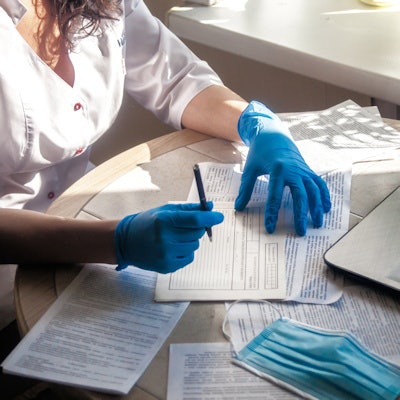
Primary care practitioners (PCPs) are frustrated and dissatisfied with the process of following up on abnormal findings on cancer screening exams, including mammography studies, a study published September 30 in JAMA Network Open found.
A team led by Dr. Steven Atlas from Harvard University also found that while most primary care doctors feel responsible for following up on suspicious findings, they also feel they aren't receiving the necessary support to do it.
"Though specialists were often involved in managing these results, PCPs viewed that they continued to be responsible for following up overdue, abnormal results," Atlas told AuntMinnie.com. "And yet they reported limited support in terms of personnel or data systems for managing these abnormal results."
Preventive screening for breast, colorectal, and lung cancer is recommended to help drive down cancer mortality rates. However, researchers pointed out that "less attention" has been paid to developing systematic processes for timely and appropriate follow-up of abnormal cancer screening test results.
In breast cancer, follow-up imaging such as repeat mammography, ultrasound, or MRI is often used when suspicious findings are found on initial screening mammography exams.
But barriers to follow-up screening for abnormal results have been reported on multiple levels. For primary care physicians, the study authors wrote that there is uncertainty about who is responsible for follow-up, as well as a lack of systems to identify and track when patients are overdue for follow-up. This uncertainty may lead to medicolegal risks, they noted.
Atlas and colleagues wanted to survey primary care doctors to gauge development of a multilevel intervention to improve follow-up practices. Through the survey, they wanted to identify responsibility for managing abnormal results, systems, and resources currently in place. They also looked at the perceived ease of scheduling follow-up care, barriers, and knowledge of follow-up recommendations.
The team looked at data from 275 PCPs from three institutions that completed the survey. Out of these, 170 were female and 201 were general internists.
Most survey respondents reported feeling responsible for managing abnormal breast screening exams at 63.6% (n = 175). This trend continued upward for other cancer types, as 81.1% (223) felt responsible when it came to abnormal lung cancer screens (p < 0.001).
Also, 46.9% (n = 127) reported being very satisfied with the management process for abnormal breast cancer screening results. Such satisfaction was even lower for cervical cancer (21.8%) and lung cancer (22.4%).
Very few PCPs reported having difficulty in scheduling follow-up breast imaging for patients with abnormal mammography findings. Out of the 275 respondents, 266 reported scheduling repeat mammography or supplemental ultrasound to be somewhat or very easy. Similar trends were seen for scheduling a breast biopsy or an appointment with a breast surgeon.
The team also found that standard processes such as automated reports, reminder letters, or outreach workers were infrequently reported. The survey respondents also reported encountering some major barriers to follow-up across all cancer types. Limited electronic health record (EHR) tools was one such barrier, while 50% felt there were major social barriers to receiving care for abnormal colorectal cancer screens.
Atlas said the team believes these results reflect the "fragmented nature" of follow-up procedures. He added that this is because while primary care physicians commonly order cancer screening tests for their patients, managing abnormal results needs collaboration with specialists involved in performing and interpreting screening tests.
"As a result, procedures to manage abnormal results vary among the different tests and within tests based upon the severity of the abnormal findings," Atlas told AuntMinnie.com. "If primary care practitioners truly are responsible for managing abnormal cancer screening results for their patients, our results argue for uniform systems to manage these results across all of the cancer screening tests."
The study authors called for "comprehensive organ-agnostic systems" to promote timely follow-up of abnormal cancer screening results using a primary care-focused approach across the range of cancer screening tests.
The team is testing one such system designed to manage overdue abnormal cancer screening test results using a population-management approach within three primary care networks. The results of this trial are currently being analyzed, Atlas said.
"We also performed a follow-up survey of primary care practitioners following the study to assess their perceptions about changes in satisfaction with managing abnormal cancer screening results," he added.




















